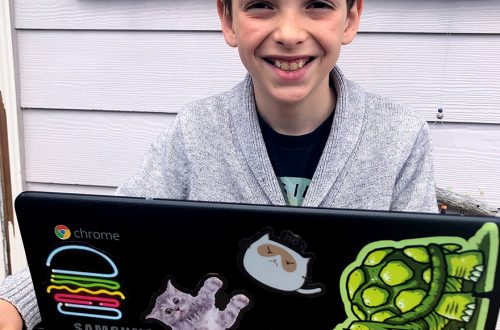
Small Businesses Serving Families Feel the Pinch
BY SUKI WESSLING
 A lot of us are feeling fear and uncertainty because of the incursion of COVID-19 into our community. Local small business owners, however, are worried about more than getting sick.
A lot of us are feeling fear and uncertainty because of the incursion of COVID-19 into our community. Local small business owners, however, are worried about more than getting sick.
“Our business is our livelihood, and if people don’t sign up for lessons, we can’t pay our employees and that creates a stress on its own,” explains Emily Zimmel of Adventure Sports in Santa Cruz. “I will try to employ my people as long as I can.”
Raising children in Santa Cruz involves an interconnected network of local families, businesses, nonprofits, and government services. Small businesses are at the center of this, providing our community with goods and services, and often operating on the edge of solvency. ‘Business as usual’ is hard enough in a county with a high cost of living, and the arrival of self-quarantine is definitely unusual.
“We are concerned for our employees, who are compensated hourly based on the number of student sessions, as well as the financial health of the business as a whole,” says Rebecca Hoover, Assistant Director at Steps to Success Educational Therapy in Santa Cruz. “Rent and utilities must still be paid, whether or not there are Educational Therapists and Specialists working with students in their respective offices.”
Our small businesses are inextricably woven into the fabric of the whole community. Emily Zimmel explains how the shutdown of UCSC has sent shockwaves into her business, which doesn’t even directly serve UCSC students.
“[One employee’s] two roommates are leaving for home and she is left with the rent to herself. Unless she can find two people to move into her house or find another place to live, she’ll also have to move home. For us that means losing an employee that we value.”
Linnaea Avenell, who runs an after school program called Little Garden Patch Farm out of her home, describes confusion and contradiction as she called multiple agencies to get guidance on what she should do.
“It was really scary to experience how long it was taking for any official guidance to come out about what we would need to do once the virus began to spread in the community,” she explains. “Information about what would happen at that stage was aimed at schools and businesses, not daycares.”
Avenell had to depend on parents in her community—including an epidemiologist and a public health worker—for guidance. She ultimately decided to close the business well before licensing agencies made the recommendation.
“I must say that although we are extremely worried about finances—March is the month when all of our big advertising bills have already come due—I’m at the same time relieved to only be responsible this week for the welfare of my own household.”
Businesses that serve children are serving a low-risk population as far as COVID-19 is concerned. But humans are connected in a complex web that links small children to more vulnerable populations. Providers are having to balance concerns of public safety with concerns about the stability of their businesses and also the mental health of their target population.
“The most concerning aspect of this is the possible decrease in educational and emotional support for our students and families, who really could use more support than ever during this period,” Rebecca Hoover says.
“Online learning is just not a feasible option for some of our students.”
“We have been very worried this past week about how children are being affected by all of this,” Avenell says.
“Even two or three weeks ago they were becoming fearful, presumably overhearing parents talking at home and perhaps hearing the news.”
Lizz Hodgin Weihrauch’s business, MusicalMe, serves preschool-aged children, and she points out the irony of having to distance small children when connection is what they need most.
“Now is when what we at MusicalMe do is most needed,” she says. “Have you seen the viral video of an empty street in Siena, Italy where everyone is at their window, singing their town’s song? It’s heart-wrenching.
Music soothes us, music unifies us. Music is a necessary part of life, especially during the hard times.”
All of our local businesses are trying to adapt as best they can. Some, like Little Garden Patch Farm, will have to wait for life to return to normal. Others are seeking out ways to serve their population as best they can.
“Our teachers and students are all looking forward to classes starting again in April, if health concerns permit,” Weihrauch says. “We’re also looking into the possibility of offering online, virtual classes. These in no way will replace the visceral, in-person experience we share in our classes, but at least it will give home-bound families with young children something special to share together.”
Growing Up in Santa Cruz, a small, local business itself, encourages you to reach out to the businesses that are suffering the effects of this devastating change.
Santa Cruz has nothing if we don’t have community.
Suki Wessling is a local writer and the mother of two grown kids. Read more at SukiWessling.com.


You May Also Like

Coloring Page
March 29, 2020
Positives of Video Games
March 28, 2020

